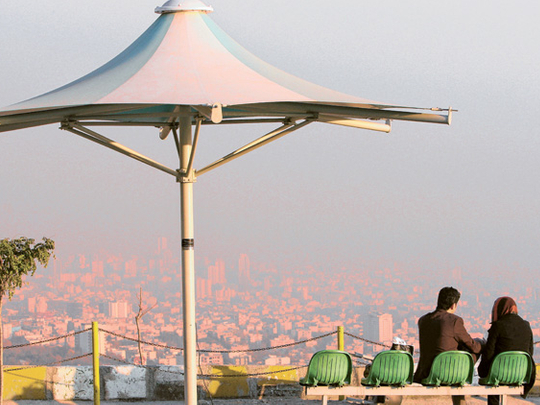
Tehran: Tehran is choking. Gridlock on urban highways makes the city feel more like Los Angeles than the Middle East, while adding a toxic yellow halo of smog to otherwise perennially blue skies.
Emergency hospital admissions have risen 20 per cent in recent days due to respiratory problems, according to the Health Ministry, and the government all but closed the capital down on Wednesday and Thursday by declaring impromptu holidays for public sector workers — a desperate attempt to clean the air.
With subsidised petrol costing 1,000 rials per litre, or about 35 cents per gallon, congestion is almost the only incentive Iranian car owners have to leave their vehicles at home and find other ways of getting around town.
Despite a growing number of imported sports utility vehicles and luxury sedans driven by the wealthy elite of northern Tehran, the roads are still full of rickety cars with outdated emissions standards.
The chief of the city traffic police was quoted by the Tehran Times in April as saying that "3.8 million cars in Tehran pollute the environment the same amount as 48 million standard cars would do".
Yet there is an alternative to being stuck in traffic. Below the streets, a gleaming subway system has been in operation since 1999, with four lines that crisscross the city. But Mohsin Hashemi, manager of the Tehran Metro, says it also risks becoming overloaded if it is not upgraded soon.
Parliament has voted to finance an extension of the existing lines, complete two new ones, and extend the network 40km, out of the city to Imam Khomeini International Airport. But the work is being delayed in what appears to be a political power struggle over the money.
A planned cut in petrol subsidies, meanwhile, will push up the price of fuel by 700 per cent some time in the coming weeks or months, potentially pushing more people out of their cars and onto the subway, which is already used by two million people every day. The Tehran city government predicts that number could to rise to 2.5 million by March 2011.
Tehran Times quoted Hashemi as saying, "The implementation of the subsidy reform plan will spark off social unrest and rioting in Metro stations if the administration does not meet its commitments in releasing money for increasing passenger capacity."
His protests and those of the mayor, Mohammad-Baqer Qalibaf, have so far failed to persuade the government to release $1 billion approved by Parliament to improve the subway. President Mahmoud Ahmadinejad has threatened to put the subway under central government control. But the issue is not just a dispute over money.
Many residents of Tehran say they believe that the subway has become a pawn in a power game between senior politicians, with Ahmadinejad refusing to release the funds to snub rivals in a deeply divided leadership.
Presidency contender
Qalibaf, a former commander of the Islamic Revolutionary Guards Corps, became mayor after losing the 2005 presidential election to Ahmadinejad, who was then the mayor. Although Qalibaf did not run again in last year's presidential election, when Ahmadinejad secured a second four-year term, many Iranians see the mayor as a possible contender for the presidency in 2013.
Hashemi, the Metro manager, is also no mere civil servant. His father is Ali Akbar Hashemi Rafsanjani, a former president who was also defeated by Ahmadinejad in 2005 and who remains an important political power broker.
Rafsanjani is a "pragmatic conservative" and a staunch critic of Ahmadinejad, who voiced sympathy for the reformists whose supporters took to the streets after losing the last presidential vote. Since the reformist camp was all but silenced by the post-election crackdown, it is conservatives within the establishment, like Rafsanjani, Qalibaf and others in Parliament and the judiciary, who pose the biggest domestic threat to Ahmadinejad — who they fear is trying to increase his presidential power at the expense of other branches of government.
"The presidential election and political rivalries have now come to an end," Amin Shabani, a lawmaker said.












